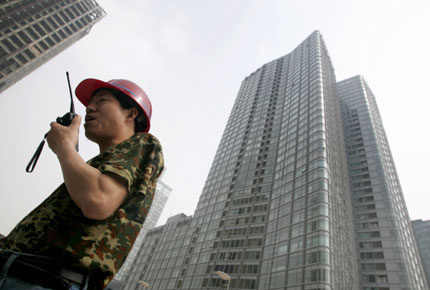
A worker uses a walkie-talkie at a construction site in China's capital Beijing May 18, 2006. [Reuters]
 |
Abstract of the Explanation on the Draft Property Law delivered by Wang Zhaoguo, vice-chairman of the Standing Committee of the National People's Congress (NPC) at the fifth Session of the 10th NPC
The property law is a basic civil law that serves to regulate property relationships and adjust civil relationships.
The draft explicitly stipulates that in the primary stage of socialism, the State upholds the basic economic system in which public ownership is dominant and the economic sectors of diverse forms of ownership develop side by side.
The State consolidates and develops the economic sector of public ownership, and encourages, supports and guides the development of the economic sector of non-public ownership.
The property of the State, the collective, the individual and other obligees is protected by law, and no units or individuals may infringe upon it.
But equal protection does not necessarily mean that all economic sectors perform the same function in the national economy.
According to the Constitution, the economic sector of public ownership is dominant, the State-owned economic sector is the leading force, and the economic sector of non-public ownership constitutes an important component of the socialist market economy.
State-owned property
The draft property law stipulates that State-owned property includes the natural resources and infrastructure belonging to the State, the property of government departments and the institutions sponsored by the State.
The draft also strengthens the protection of State-owned property.
It stipulates any unit or individual that, in violation of the provisions on management of State-owned property, causes loss of State-owned property by transferring it at a low price, illegally sharing it in conspiracy with another person, placing a charge over it without authorization, or by other means in the course of restructuring the enterprise, merger or division of the enterprise, or affiliated transaction, shall bear legal liability according to law.
The draft states supervisors who cause loss of State-owned property due to their abuse of power or dereliction of their duties shall bear legal liability according to law.
Property of the collective
In order to grant the farmers a long-term and guaranteed land-use rights, the draft stipulates that:
At the expiration of the term of a contract for a piece of farmland, grassland or forest land, the contractor of the right to land contractual management may have the contract renewed in accordance with the relevant provisions of the State.
Because the social security system in the rural areas has not yet been established in an all-round way and that the right to land contractual management and the house-site-use right provide the farmers' lifelong foundation, the conditions for lifting such restrictions are not yet ripe.
The draft leaves the issue to be dealt with by other laws and regulations such as the Land Management Law.
Compensation for expropriation
The draft stipulates that, for public interest, land owned by a collective and the houses and other immovables of the units and individuals may be expropriated within the limits of power and according to the procedures as provided for by law.
Compensation shall be paid for the land expropriated, subsidies for resettlement, compensation for the fixtures and young crops on land, and the premiums for social security of the farmers whose land is expropriated shall be allocated in full.
The draft also stipulates that compensation should be paid for the expropriation of the houses. In view of the regional unbalanced development, compensation shall be formulated according to specific circumstances.
Private property
The draft law stipulates that the State protects the lawful property of individual persons, such as lawful incomes, houses, deposits, investments and the gains from the investments, as well as the rights of individuals to inheritance.
The draft says that building owners shall enjoy ownership over the special parts within a building, such as the residential units and the units for business purposes, and enjoy the right of sharing and jointly managing the common parts, such as the public facilities.
China Daily
See full text of the Explanation on China's draft property law on chinadaily.com.cn
(China Daily 03/09/2007 page6)

